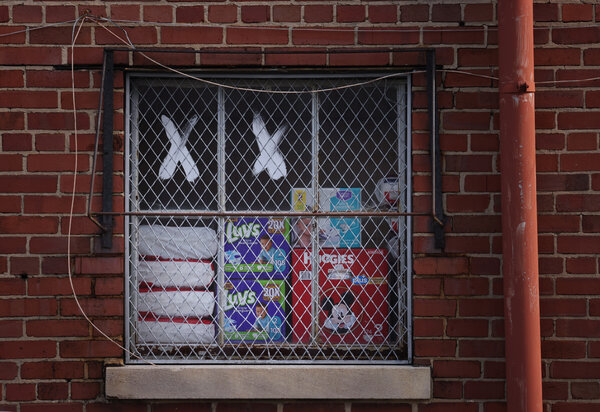Pandemic Leaves More Military Families Seeking Food Assistance – The New York Times
Veterans are in a similar situation, hunger advocates and service organizations have found.
WASHINGTON — Fort Bragg, the largest military base in the United States, has all the trappings of a small American city: shopping centers, a barber shop and social clubs. In a sign of the times, it also has a food bank.
This spring, the Y.M.C.A. on base — which started a food pantry last year to respond to the growing food insecurity among military families — saw a 40 percent increase in requests for groceries. During the same period, grocery requests to AmericaServes, a network that helps military families, jumped to the biggest service request in the organization’s history.
The story is much the same around the country, hunger groups say, for the lowest-income families in the military, who have a specific set of challenges, and different from civilians whose economic fortunes have also been damaged by the coronavirus pandemic.
Spouses of active-duty troops have lost jobs, the same as thousands of other Americans, but are often the least likely to be able to find new ones. Children who rely on free or reduced meals at school no longer are receiving them, and military families often have more children than the national average.
“A lot of kids who were getting breakfast and lunch at school no longer are,” said Michelle Baumgarten, the associate executive director of the Armed Services Y.M.C.A. at Fort Bragg, in North Carolina, who said peanut butter and jelly and oatmeal requests have soared. “Families were going from two incomes to one income is the common thread.”
While many poor civilian families have turned to federal food programs for support, military families often receive a housing allowance that renders them ineligible for food assistance, a quirk in the law that Congress has repeatedly failed to resolve.
The most junior enlisted personnel earn $1,733 to $2,746 a month; 7 percent to 18 percent of military families and veterans have had someone in their house seek emergency food assistance, according to a report from the advocacy group Blue Star Families.
While military families make up a small portion of the 37 million Americans struggling with food insecurity, hunger experts say most Americans have no idea that people serving in the military often need to rely on help to eat.
“There is something that’s so unjust about it that the families who are making significant sacrifices for our country, and are not able to fully meet their basic needs,” said Josh Protas, the vice president of public policy at Mazon, a Jewish group focused on hunger. “The charitable sector doesn’t have the capacity to fully address this issue — nor should it. I really think the Pentagon has really tried to sweep this under the rug.”

The Defense Department is working on a report to Congress on the topic, said Maj. César Santiago, a Pentagon spokesman.
Veterans are in a similar situation, hunger advocates and service organizations have found. Food help has become the No. 1 request at Serving Together, an organization that assists veterans and military families in Maryland and Washington, for the first time in at least five years, said Jennifer Watson, a program manager there. The group has a partnership with two other organizations, and teenagers have been helping to distribute food boxes to hungry veterans.
Military families had distinct problems in the economy long before the coronavirus pandemic hit the United States. Spouses of members of the military have high unemployment — roughly 25 percent — because of their constant relocations and inability to transfer professional licenses from state to state.
Because they are so mobile, military spouses tend not to accrue seniority in the workplace, and so often are the first fired and the last rehired in a weak economy. Many of the families have difficulty managing money.
“Military families, particularly junior enlisted people, struggle with financial literacy,” said Daniel Gade, a retired Army lieutenant colonel who now teaches public policy at American University in Washington. “Military families are often rather isolated, which means they have a thinner social network.”
According to a recent study from the Institute for Veterans and Military Families at Syracuse University, nearly 40 percent of active-duty families had food and nutrition support needs since the pandemic hit.
While rent forgiveness and unemployment insurance claims covered other basic costs, food has leapt to the front of the line of needs. “In nearly six years of supporting coordinated care networks around the country, food assistance has never cracked the top three requested services over all,” said Nick Armstrong, the senior director of research and data for the institute.
On a recent Wednesday, the food pantry at Fort Bragg was buzzing with business. “It’s been eye-opening to see the families that do struggle in the military,” said Rachel Szabo, who was recently laid off from her job in industrial design.
Her husband, who is stationed at Fort Bragg and is on the lower end of the pay scale, and Ms. Szabo, who is pregnant, have been getting help from the Y.M.C.A. at the base, which began its food program a year ago and has seen explosive growth in need. “I had never needed to reach out for assistance,” Ms. Szabo said. “When I did lose my job, we still had bills. I have a lot of student loans still, so being able to reach out to the Y to make ends meet has really been a lifesaver.”
In San Diego, another Y.M.C.A. program is distributing meals to 1,000 children in military families weekly, and its food distribution for that group has increased by over 400 percent since the pandemic began. “The greatest need has come from our military kids no longer being in school,” said Tim Ney, who runs a program for military families there. “They no longer have access to the free or reduced cost meals.”
The Pentagon says the issue of hunger on military bases — which have had food pantries for years — is overstated.
“Military members are very well paid,” said Major Santiago, citing a recent study conducted by RAND National Defense Research Institute. “Junior enlisted members, on average, are paid better than 90 percent of the adult working population with a high school education and similar years of experience in the work force. The issue of food insecurity has been examined and found to be minimal in the military.”
Several members of Congress disagree and have been working on legislation to change the housing benefit that prohibits some families from getting food assistance.
“Our military is weakened when service members are unable to feed their families,” said Senator Tammy Duckworth, Democrat of Illinois, who has tried repeatedly to change the law to no avail.
Mr. Gade, a Republican who ran unsuccessfully for senator from Virginia this year, acknowledged that his party is often hostile to the Supplemental Nutrition Assistance Program, or SNAP, as food stamps are also known. But he said that he believed the parties could find common ground on this particular issue.
“We know SNAP isn’t going anywhere,” he said, adding that fixing what he called the “egregious” rule “is something we can do together.”
Published at Wed, 16 Dec 2020 11:27:00 +0000






Comments
Loading…